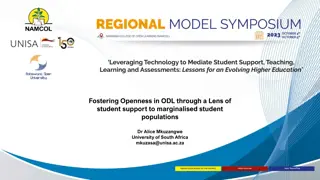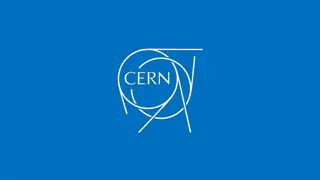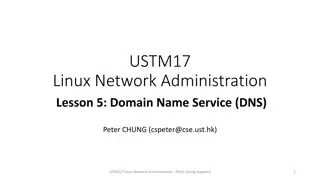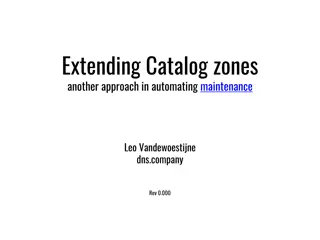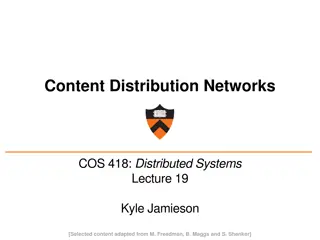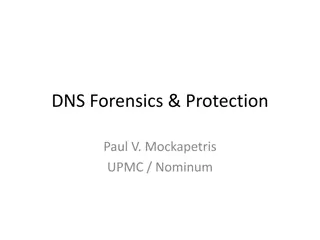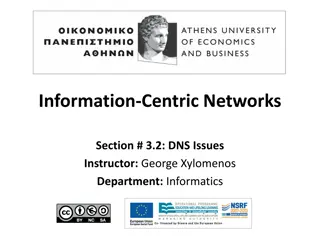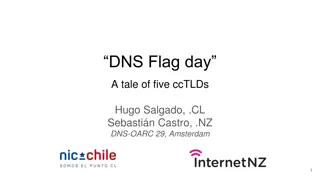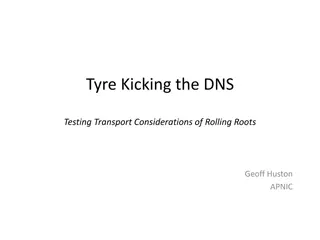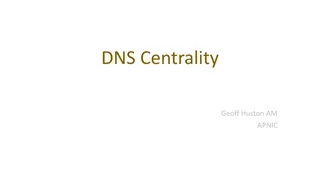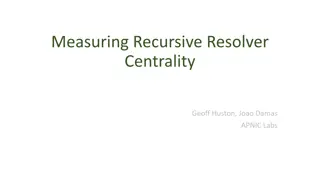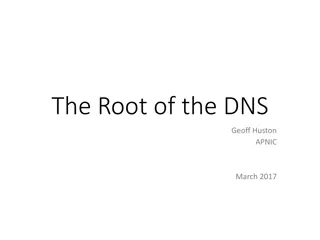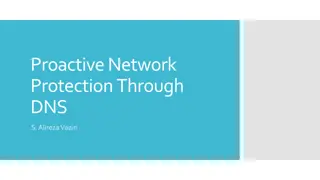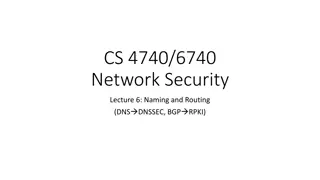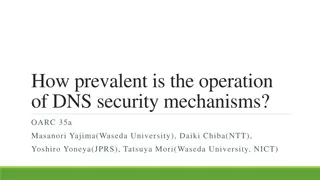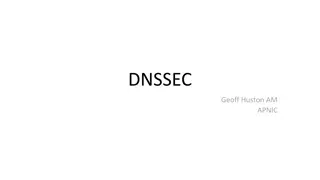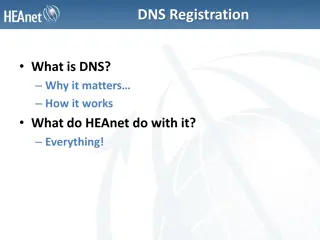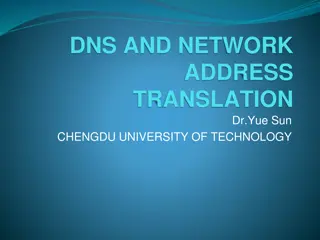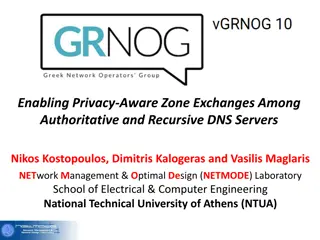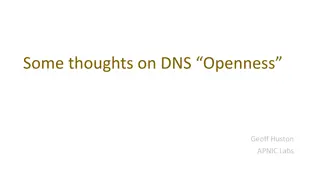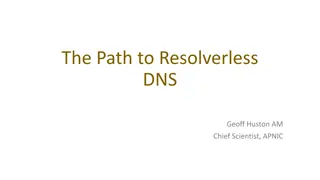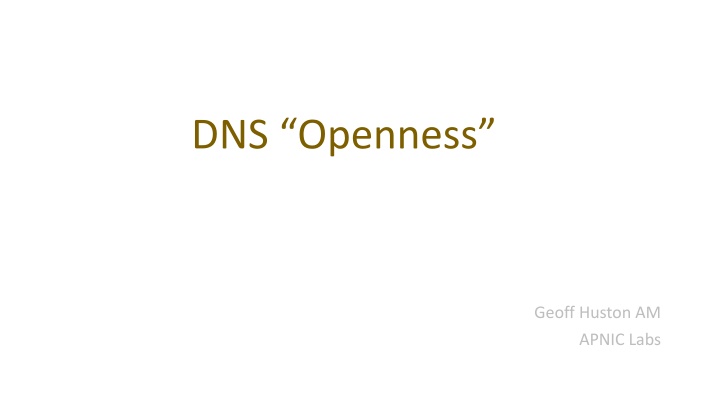
DNS Openness and Potential Limitations
Explore the concept of DNS openness and its implications for accessing and distributing information. While the DNS was designed to provide consistent responses regardless of the user or location, various factors such as governmental regulations and ISP practices can impact DNS resolution. Discover the complexities of maintaining a universally consistent DNS experience in the face of these challenges.
Download Presentation

Please find below an Image/Link to download the presentation.
The content on the website is provided AS IS for your information and personal use only. It may not be sold, licensed, or shared on other websites without obtaining consent from the author. If you encounter any issues during the download, it is possible that the publisher has removed the file from their server.
You are allowed to download the files provided on this website for personal or commercial use, subject to the condition that they are used lawfully. All files are the property of their respective owners.
The content on the website is provided AS IS for your information and personal use only. It may not be sold, licensed, or shared on other websites without obtaining consent from the author.
E N D
Presentation Transcript
DNS Openness Geoff Huston AM APNIC Labs
Openness? When speaking about openness, we do not mean open in a competitive sense, but rather: Can users access and distribute information and content, use and provide applications and services, and use terminal equipment of their choice, irrespective of the user s or provider s location or the location, origin or destination of the information, content, application or service? 2
But that was the entire POINT of the DNS! The DNS was engineered to deliver the same answer to the same query, irrespective of the querier The answer did not depend on who was asking, where they were asking from, what platform they were using to generate the query, the resolvers they used to handle the query The answer did not depend on the origin of the information used to form the response, the platform used to serve this information, nor the location of information servers 3
Openness? When speaking about openness we do not mean in a competitive sense, but rather: Can users access and distribute information and content, use and provide applications and services, and use terminal equipment of their choice, irrespective of the user s or provider s location or the location, origin or destination of the information, content, application or service? The answer is Yes! 4
Really? Is that really true? Do we all see the same DNS? Really? 5
Really? Is that really true? Do we all see the same DNS? Really? 6
Really? Not! Why not: Government regulatory requirements to block the correct resolution of certain DNS names It happens in China, UK, America, Australia, India, Russia, Syria, Iran, Vietnam, France, Turkey, .. Its VERY widespread, for all kinds of national motives Occasional ISP desires to monetise the DNS NXDOMAIN substitution to direct traffic from named destinations or services that do not exist to other destinations or services of their choosing Threat mitigation where the DNS names associated with malware are blocked Such as Quad9 threat intelligence informed DNS resolution 7
Is this a problem? Generally not: Nation states have a sovereign right to make such rules and bind their citizens to such rules Threat mitigation is typically regarded as a Good Thing rather than an incursion against the utility of a single DNS It s a problem when it gets used as a lever in a different fight Such as the Australian rule to force Australian ISPs to block the DNS resolution of thepiratebay.org It only pushes determined users to alternate name resolution strategies and ultimately is a comprehensive waste of everyone s time! But even this is a relative sideshow to the larger DNS 8
Another interpretation of Openness? When speaking about openness we might not mean open in a sense of consistency across providers and across client transactions, but rather: Is the DNS an open system? This is an echo of the 1980 s move by the industry embrace open technology, as in Open Systems Interconnect (OSI) for networking, open computer architectures, openoperating systems. Open is being used here in the sense that it is intentionally positioned as the opposite of a vendor-proprietary closed technology. 9
Is the DNS Open? Yes! The DNS name resolution protocol is openly specified without any IPR encumbrance Fully functional implementations of the DNS protocol are available as open source DNS name servers are configured as open promiscuous responders and will provide the same response to a query irrespective of the identity of the querier DNS information is openly available There is some subtle qualification here in that the collection of a zone file may not be openly available, but the individual records in a zone can be queried DNS queries and responses are open 10
Is the DNS Open? Yes! The DNS name resolution protocol is openly specified without any IPR encumbrance Fully functional implementations of the DNS protocol are available as open source DNS name servers are configured as open promiscuous responders and will provide the same response to a query irrespective of the identity of the querier DNS information is openly available There is some subtle qualification here in that the collection of a zone file may not be openly available, but the individual records in a zone can be queried DNS queries and responses are open Which is a MASSIVE problem! 11
When openness is a weakness The DNS is used by everyone and everything Because pretty much everything you do on the net starts with a call to the DNS If we could see your stream of DNS queries in real time we could easily assemble a detailed profile of you and your interests and activities - as it happens! If we could edit your DNS responses we could make services disappear from your Internet!
Lets look into this further The DNS is mapping system which takes human-use labels that name services and maps these labels to IP addresses 14
Lets look into this further The DNS is mapping system which takes human-use labels that name services and maps these labels to IP addresses 1. Connect to www.google.com 2. Send a TCP SYN packet to destination 142.250.204.4 DNS: What s an IP address for www.google.com? DNS System 142.250.204.4 15
Whats in that DNS cloud? How the idealised model of the DNS works DNS Server Client DNS Resolver 16
Clients, Resolvers and Servers Clients send their query to a resolver The resolver s addresses was provided to the client by their ISP, or the user configured it directly into their device When it receives a query, the resolver first must work out whom to ask (discover the authoritative server for this domain name) and then it will direct a query to this server The resolver will use this response to answer the original query from the client And the resolver will also cache the answer to allow it to reuse this information if it is asked the same query in the future. 17
Clients, Resolvers and Servers Clients send their query to a resolver The resolver s addresses was provided to the client by their ISP, or the user configured it directly into their device When it receives a query, the resolver first must work out whom to ask (discover the authoritative server for this domain name) and then it will direct a query to this server The resolver will use this response to answer the original query from the client And the resolver will also cache the answer to allow it to reuse this information if it is asked the same query in the future. 18
Scaling DNS infrastructure Large scale DNS resolvers are generally implemented as a DNS server farm , where incoming queries are farmed across multiple resolver engines Very large DNS resolvers use a common front end service IP address farms, and use anycast to perform query load balancing over multiple distributed resolver farms Authoritative servers have also taken to anycast, both as a scaling option and a DOS defence 19
Whats REALLY in that DNS cloud? DNS Resolver Resolver DNS DNS Resolver Resolver DNS Resolver DNS DNS Resolver Resolver Client DNS Server DNS DNS Resolver DNS Resolver DNS Resolver DNS Resolver DNS Resolver Resolver DNS Resolver DNS DNS Resolver Resolver DNS Resolver DNS DNS Resolver Resolver DNS 20
The Hidden parts of Open For an open technology the infrastructure and process of name resolution in the DNS is incredibly opaque Once queries are passed to the DNS resolution infrastructure they are impossible trace. Each element does not simply forward a query, but recasts a new query using its own identity There is no query tracing and no clear way to probe into the DNS infrastructure There could be query chains circling in the DNS infrastructure in a hidden loop and no one would be any the wiser! It is challenging to gauge the level of hidden interdependency in the DNS, nor the level of ongoing centralisation of infrastructure functions in the DNS 21
But all that is still not all of the DNS The DNS is more than its mapping role, and more than its infrastructure elements of resolvers and servers So what is the DNS? 22
What is the DNS? A name space: A collection of word-strings that are organised into a hierarchy of labels A distributed name registration framework that assigns a unique license to use to human-centric word-strings to entities (for money) A distributed database that maps human-centric word-strings into IP addresses A protocolused by DNS protocol speakers to resolve a word-string into a defined attribute (usually an IP address) A signalling medium that is universally supported across all of the Internet 23
Orchestration of the DNS If the DNS is a set of functions and a set of various actors in this space then how are their individual actions orchestrated to provide a cohesive outcome? How can client use the functions of the DNS if there is no one orchestrating all these elements of the name infrastructure? Why does all this work in a completely deregulated space? The answers lie in Markets and Market Signalling 24
What are DNS Markets? The DNS is not a single market it is a highly devolved framework and there are a number of discrete markets that are at best loosely coupled . Some of these are: The market for new top level labels (gTLDs) operated by ICANN. This market is open to ICANN- qualified registry operators. A registry has an exclusive license to operate a TLD. The market for registrars , who act as retailers of DNS names and deal with clients (registrants) and register the client s DNS names into the appropriate registry The market for clients to register a DNS name with a registry The market for DNS name certification, which is a third party that attests that an entity has control of a domain name The market for DNS name resolution where users direct their queries to a resolver and the resolver provides DNS answers The market for hosting authoritative name services, where bigger is better has driven a highly aggregated market The market for DNS query logs 25
Maybe its more than markets Perhaps this is best viewed as a collection of market needs, or requirements Some are well established Some are emergent requirements Perhaps the question could be rephrased as one that asks to what extent are conventional open markets a good fit for these various DNS requirements And to what extent these market-based mechanisms are failing to respond to these needs? 26
So, what should we talk about? If we want to talk about the DNS as a deregulated activity orchestrated through the operation of open markets then there are a few more things to bear in mind: The DNS is not a single market place, or even a collection of inter-dependent and tightly coupled market place The DNS is constructed of many elements, some of which appear to behave as tightly regulated markets, some of which are openly competitive markets, some of which are comprehensive market failures! Maybe we should think of the DNS using a number of themes to give some focus to this consideration of market effectiveness 27
Current DNS Themes There are so many, and here are just a few: DNS as a control element DNS and privacy DNS and trust DNS and name space fragmentation DNS as a rendezvous tool DNS as a collection of markets DNS and market aggregation DNS and abuse and cyber attacks DNS as an economic failure DNS as the last remaining definition of a coherent Internet 28
This is now a very big agenda Far bigger than we have time for here! So I ll just take a couple of themes and develop them further 29
DNS and Trust Can you trust what you learn from the DNS?
DNS and Trust Can you trust what you learn from the DNS? NO!
DNS and Trust Can you trust what you learn from the DNS? NO! DNS responses can be altered in various ways that are challenging to detect We know how to improve this situation by using digital cryptography to protect the integrity, accuracy and currency of DNS responses But does this capability for an improvement in the trust of the DNS correlate to a visible consumer preference? Is security in the DNS a market failure?
DNSSEC A framework to attach digital signatures to DNS responses that attest to the accuracy and currency of the DNS response The method of attachment doe not alter the behaviour of the DNS protocol, nor does it require any changes to DNS servers A procedure for clients to follow to validate the DNS response through the processing of this digital signature Changes: Zone management add DNSSEC digital signature records through zone signing Registry management add DS records alongside NS records for delegated zones Client behaviour perform additional DNS queries to perform digital signature validation 34
Is DNSSEC being used? You might think that a change to the DNS that improved the trust in the DNS would prove to be highly popular in the DNS space DNS name owners would like their name to be trustworthy DNS users would like the names they use to be genuine and trustable So every client of the DNS would want to use DNSSEC! Right? So let s see if this requirement has been translated by the DNS service market into a service offering by looking at the current metrics of the use of DNSSEC 35
Is DNSSEC being used? Who validates DNS responses? 36
Is DNSSEC being used? Who validates DNS responses? 37
Is DNSSEC being used? Validation Rate of Signed DNS responses 25% of users are behind DNSSEC-validating resolvers who will not resolve a badly signed DNS name 2014 2016 2018 2020 38
Is DNSSEC being used? Validation Rate of Signed DNS responses Three quarters of the Internet s user base can t or won t check if a DNS response is genuine 2014 2016 2018 2020 39
Problems with DNSSEC Large DNS responses cause robustness issues for DNS Getting large responses through the network has reliability issues with UDP packet fragmentation and timing issues with signalled cut-over to TCP The validator has to perform a full backtrace query sequence to assemble the full DNSSEC signature chain So the problem is that DNSSEC validation may entail a sequence of queries where each of the responses may require encounter UDP fragmentation packet loss All this adds to the time to resolve a signed name And nobody is tolerant of delays in today s Internet 40
Some More Problems with DNSSEC Cryptographically stronger keys tend to be bigger keys over time, so the issue of cramming more data into DNS transactions is not going away! The stub-to-recursive hop is generally not using validation, so the user ends up trusting the validating recursive resolver in any case The current DNSSEC framework represents a lot of effort for only a a tiny marginal gain 41
DNSSEC is a Market Failure! Users don t pay for queries Users have no leverage with recursive resolvers in terms of expressing their preference for authenticity in DNS responses Users don t have a choice in what they query for Users have no ability to express a preference for only using domain names that are signed The benefits of a signed DNS zone and validating resolvers are indirect Cost and benefit are totally mis-aligned in this space! 42
DNSSEC is a Market Failure! If it wasn t for the lead taken by Google and their adoption of DNSSEC validation in their Public DNS Service then its likely that DNSSEC would still be a complete failure And only was possible because of the significant level of market share in the use of Google s Public DNS Service So perhaps we should look at the market for resolvers 43
Who resolves Names? My ISP Google Same country, different network (likely to still be my ISP) Everyone else 45
Who resolves Names? If this is a market then it appears to be highly skewed: Google has a market share of just under 30% of all users The next largest open resolvers are Cloudflare (4%), OpenDNS (2%) and Quad9 (0.5%) Everything else is just the default of the local ISP performing the name resolution service for their customers Why has this happened? How has Google succeeded and other open DNS resolver services appear to struggle to get significant adoption by clients? 46
The DNS Name Resolution Economy In the public Internet, end clients don t normally pay directly for DNS name resolution services Which implies that outside of the domain of the local ISP, DNS resolvers are essentially unfunded by the resolver s clients And efforts to monetise the DNS with various forms of funded misdirection (such as NXDOMAIN substitution) are generally viewed with extreme disfavour Open Resolver efforts run the risk of success-disaster The more they are used, the greater the funding problem to run them at scale The greater the funding problem the greater the temptation to monetise the DNS resolver function in more subtle ways
Google is Special Search is a critical asset for GOOGLE Search drives eyeballs and profiles Eyeballs and profiles drive advertising Advertising drives revenue If we could use the DNS as a defacto search engine then Google has a problem But that s what is happening when DNS resolvers don t pass back NXDOMAIN but instead pass back a reference to a search engine, or even better use a search engine to pass back the resolution response that a hidden search engine obtained when it processed the queried DNS name So it s in Google s interests to have a fast, accurate and unaltered DNS resolution service And Google s real target market for this service is not individual users, but ISPs Because the real threat model for Google is NXDOMAIN substitution and other forms of DNS response manipulation by ISPs as a local revenue source No other Open DNS resolver service shares Google s motivation 48
The DNS Name Resolution Economy The default option is that the ISP funds and operate the recursive DNS service, funded by the ISP s client base >70% of all end clients use their ISPs DNS resolvers However the fact that it works today does not mean that you can double the input costs and expect it to just keep on working tomorrow For ISPs the DNS is a cost department, not a revenue source We should expect strong resistance from ISPs to increase their costs in DNS service provision 49
The resistance to change in the DNS The quality of an ISP s DNS service does not appear to be a significant competitive discriminatory factor in the consumer market So the ISP does not generally devote many resources to tuning their DNS infrastructure for high performance, resiliency and innovation Most users don t change their platform settings from the defaults and CPE based service provisioning in the wired networks and direct provisioning in mobile networks will persist So current innovations such as improved DNS privacy (DNS over TLS, DNS over HTTPS) are looking like being another mainstream market failure in the DNS space

